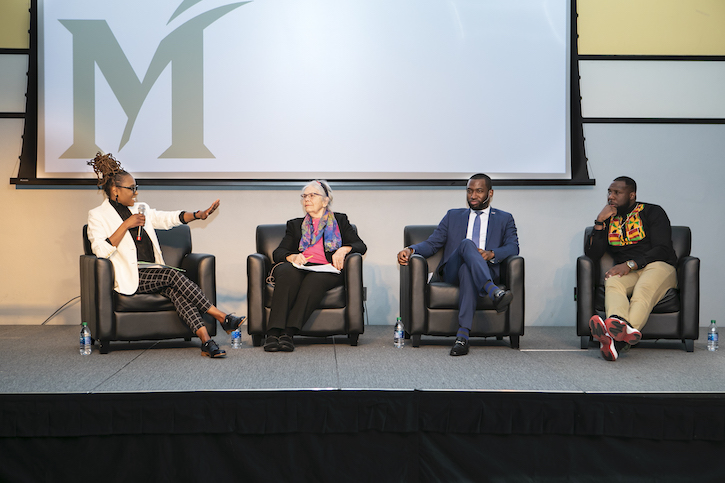
Wendi Manuel-Scott (far left) moderated a conversation around the power of symbols, statues and race in 21st-century America with guests Richmond community activist Martha Rollins, Richmond Mayor Levar Stoney, and former Charlottesville Vice Mayor Wes Bellamy for the 2020 Freedom and Learning Forum earlier this year. Photo by Ron Aira/Creative Services.
Friday marks Juneteenth, also known as Freedom Day, Emancipation Day, or Jubilee Day. Juneteenth commemorates June 19, 1865, the day that news of the Emancipation Proclamation finally reached Galveston, Texas, more than two years late. All African Americans in Texas were finally free from inheritable and lifelong bondage. Juneteenth is the oldest nationally celebrated commemoration of the ending of slavery in the United States.
Juneteenth has long been a day of remembrance and an opportunity for Black people in the U.S. to honor their history and emphasize their citizenship.
Wendi N. Manuel-Scott, a professor within George Mason University’s School of Integrative Studies and the Department of History and Art History, recently discussed the importance of Juneteenth and how to best commemorate it.
Q: What is important to understand about Juneteenth?
A: Juneteenth provides us with an opportunity to understand the long, long history of racism in the United States and the creative and courageous ways that Black folk have resisted American racism and discrimination.
Juneteenth has historically been an opportunity for African Americans to collectively gather and celebrate Black freedom. Yes, there’s food and games and singing and dancing, but there are other things that happen during Juneteenth celebrations. At the heart of a Juneteenth celebration is a political, civic demonstration of Black freedom. During the late 19th and early 20th century, some African American communities collected money to purchase land upon which they could build schools and churches and collectively realize their status as free people. Juneteenth events also provided Black people with a public space for engaging in debate and conversation about voting and access to the ballot box.
What are ways that we can commemorate Juneteenth?
If we understand the genesis of Juneteenth, then core to any Juneteenth activity must be learning about African American history, civic engagement, and freedom making for all. This means that we can’t let the celebratory spirit of the day erase the long history of protest against anti-Black violence. It’s important to use this holiday to remember Black liberatory work and the courageous activism of many unnamed and unknown people.
If you have young children, then read books about African American history and have a conversation about civil rights activists. If you are older, ask your friends to listen to a podcast about how to be antiracist before having a celebratory meal. Or, perhaps require everyone in your circle to fill out the U.S. Census and register to vote.
I also think we should consider how we can meaningfully commit to the spirit of Juneteenth as individuals. We can donate to or volunteer for organizations doing antiracist work or commit to supporting Black businesses. Teachers and professors can use this summer as an opportunity to reimagine curriculum and center Black, Indigenous, and People of Color scholarship in their syllabi.
How can we can educate ourselves and others about our history of racism?
We all need to do our research around systemic racism and what it means to be antiracist.
Every person should have “How to be an Antiracist” on their bookshelves. Read it. Read everything you can. Listen to podcasts, and watch films that explore the deep entangled roots of American racism. If you want to learn about student research that led to the Enslaved People of George Mason memorial, listen to the Access to Excellence podcast.
Have difficult conversations. Many students have shared with me how hard it is to engage in uncomfortable conversation with family members who struggle to understand the Black Lives Matter movement but this moment provides an incredible opportunity—an opening—for intensive one-on-one work. These intimate conversations about racism can be transformative.
The Blacks Lives Matter protests have raised awareness of systemic racism and police brutality. How do we expand on this movement to further change?
We all need to understand that racism is normalized and exists everywhere—in the nooks, crannies, and cracks of our society. Racism exists in every institution, and our work at this moment is to name it and denormalize it. We need to challenge policies and structures that are rooted in anti-Black hierarchies and logic. That is the work that we must do, young and old, and everyone in-between, to help realize transformational change. We must disrupt racism wherever it exists. Full stop.
